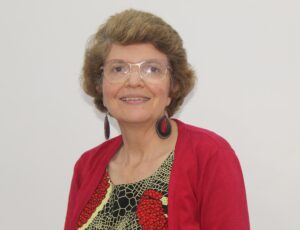This weeks’ blog is by Prof Julia Downing, Chief Executive International Children’s Palliative Care Network, (Julia.downing@icpcu.org)
The report on ‘Unleashing the Power of the Nurse to Achieve Health Equity’ 1 highlights the role of nurses in promoting and enabling health for all, regardless of who we are or where we live. As nurses we can be catalysts for change as we collaborate with people, communities and organisations to promote good health and relieve suffering. However, in order to do this we also need to work in systems that enable nurses to reduce barriers to care, value and respect the contribution of nurses and challenge inequalities. If we are to do this, we need a ‘voice’, a ‘place at the table’ to ensure that we can meet the needs of the patients, families and communities that we work with.
The All-Party Parliamentary Group on Global Health 2 discusses the Triple impact of developing nurses, so they play a crucial role in improving health, promoting gender equality and supporting economic growth. Alongside this, the State of the Worlds Nursing Report 3 and the WHO’s ‘Global Strategic Directions for Nursing and Midwifery’ 4, all stress the importance of developing nurse leadership, and the essential role that nurses have in the provision of healthcare. With nurses accounting for >50% of the global health workforce 3 we are in a key position to effect change, to increase access to care, to improve outcomes of care, and reduce unnecessary pain and suffering.
As a nurse working in children’s palliative care, I am acutely aware of the millions of children and their families experiencing unnecessary pain and suffering as they do not have access to palliative care. With over 21 million children and their families globally needing palliative care 5, 98% of whom live in low-and-middle-income countries 6, it is estimated that only 5-10% of children can access such care. This must change, we need to improve access to palliative care around the world, we have a moral imperative to do so, and we cannot stop until every child and their family have access to the care they need. This applies to all spheres of healthcare. As nurses we work in many situations, in preventing, managing and reducing suffering, and yet we know that around the world, individuals and their families are suffering needlessly, whether that be due to illness, climate change, armed conflict, humanitarian disasters, or lack of access to health care, to treatment, to necessary medicines.
We work in complex, volatile and changing environments, in environments where we need to and can have a voice, where we can make a difference. Together as we lead, as we work together to bring about change in our workplaces, nationally, regionally and globally, wherever our sphere of influence, as nurses we can and must reduce unnecessary pain and suffering – it may mean that we need to ‘step outside of our comfort zone’, to change directions, to lead the way and persevere so that together we can reduce inequality and inequity in children’s palliative care.
References
1. National Academy of Medicine. Unleashing the Power of the Nurse to Achieve Health Equity. https://nap.nationalacademies.org/resource/25982/FON%20Power%20of%20the%20Nurse.pdf Accessed 30th September 2024.
2. All Party Parliamentary Group on Global Health (APPG) (2016) Triple Impact. How developing nursing will improve health, promote gender equality and support economic growth. London, House of Commons.
3. World Health Organization. (2020) State of the world’s nursing 2020: Investing in education, jobs and leadership. Geneva: World Health Organization. Licence: CC BY-NC-SA 3.0 IGO
4. World Health Organization (2021) Global Strategic Directions for Strengthening Nursing and Midwifery 2021-2025. https://www.who.int/publications/i/item/9789240033863 Accessed 30th September 2024.
5. Connor SR, Downing J, Marston J. (2017) Estimating the global need for palliative care for children: A cross-sectional analysis. Journal of Pain and Symptom Management. 53(2):171-177.
6.. Knaul FM, Farmer PE, Krakauer EL, De Lima L, Bhadelia A, Kwete XJ, Arreola-Ornelas H, Gómez-Dantés O, Rodriguez NM, Alleyne GAO, Connor SR, Hunter DJ, Lohman L, Radbruch L, del Rocío Sáenz Madrigal M, Atun R, Foley KM, Frenk J, Jamison DT, Rajagopal MR, on behalf of the Lancet Commission on Palliative Care and Pain Relief Study Group. Alleviating the access abyss in palliative care and pain relief—an imperative of universal health coverage: the lancet commission report. Lancet. 2018;391(10128):1391–454.
